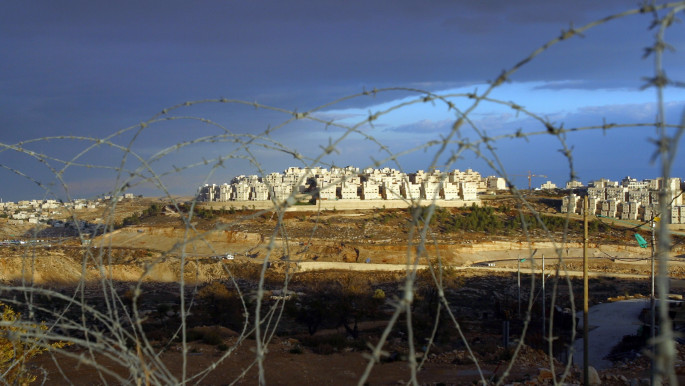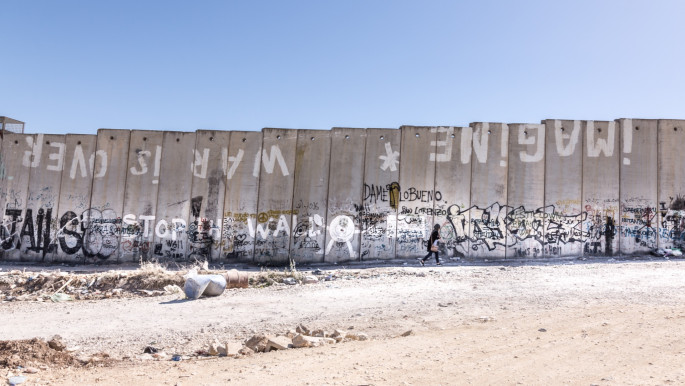As annexation looms, no one is ready to hold Israel accountable
As Israel prepares to formalise its de facto annexation of occupied Palestinian territory in the West Bank, states and political figures have issued statements opposing what is undeniably an illegal act of the highest order.
But a closer look at what is happening in international circles provides enough evidence that the same cycle of impunity and lack of consequences will repeat itself and that when it is all said and done, Palestinians will be asked to show "willingness" to engage in a political process that will get them absolutely nothing beyond the dismal status quo.
For decades, Israel has used the same playbook to carry out its most outrageous illegal acts. First, it announces its intention to carry out a big and shocking step. Israeli leaders then take a seat and watch as world leaders and international figures express their "concern" or "opposition" at the planned action.
Israel then ups the stakes by insisting it will carry out the plans and audaciously claims that illegal acts like settlement construction, building the separation wall, or currently annexation, would be "in the interest of peace". This is an argument that Israeli officials, pundits, and fanatical US allies now make on annexation without flinching.
Political actors rush to find a middle ground with Israel. By a combination of pampering, pandering, and grovelling, states shower Israel with political and economic bribes to dissuade it from its intended plans. They warn Israel that such a move would "harm Israel's image" or "not serve Israeli interests" while Palestinian rights are discarded as a consideration.
 |
For decades, Israel has used the same playbook to carry out its most outrageous illegal acts |  |
Israel then plays hard to get, highlighting alleged internal pressures and the need to balance international considerations with domestic ones. These leaders, we are told, cannot face the pressure of the right, which demands more settlements, more walls, and now all or most of the occupied West Bank as well as a commitment that no Palestinian state would be established west of the Jordan River.
Then, in what is packaged and sold as a great concession, Israel announces it will not implement its controversial (and usually illegal) plan in full as the world responds with praise and relief, demanding that Palestinians respond in kind to this alleged sign of good will.
 |
|
| Read more: How will the EU respond to Israel's West Bank annexation plans? |
In the end though, the Israeli plan in question is fully implemented but in stages, to allow for the required watered-down international response and to provide states with a way out of exacting political and financial consequences, which is their duty to do under international law. In the case of annexation though, Israeli politicians are making no secret of their plan to carry out annexation incrementally.
Examples of this tried and tested playbook abound. But the construction of Israel's annexation wall is a glaring example. In 2004, the International Court of Justice ruled that Israeli settlements and the wall in the West Bank were illegal and amounted to de facto annexation.
The Court also ruled that Israel must dismantle the wall and pay reparations to the thousands of Palestinians whose lives and livelihoods were crushed by this wall. The UN General Assembly adopted the ruling. That was 16 years ago.
But Israel's construction of the wall and expansion of settlements at the expense of Palestinian rights and land did not stop and the international community offered nothing more than rhetorical opposition in response. Eleven years after the ICJ ruling, the European Commission issued a notice to members saying that products made in any Israeli settlement must be labelled as such and cannot be labelled as made in Israel.
 |
Israel has been unequivocal in its commitment to preventing the realisation of Palestinian statehood |  |
Four years later, the European Court of Justice affirmed that obligation. To date, the symbolic step of labelling goods originating from illegal Israeli settlements on stolen Palestinian land remains elusive.
More advanced steps have also proven nearly impossible to achieve. Just this month, government coalition talks in Ireland nearly collapsed over disagreements on including commitments to pass a bill banning Israeli settlement products, even though it had passed both houses of parliament. The foreign minister, Simon Coveney, who staunchly opposed the bill from the start, said it "wasn't implementable".
The same playbook of impunity was also evident in the voting of EU members of the Human Rights Council on 20 June on a resolution titled, "Ensuring accountability and justice for all violations of international law in the Occupied Palestinian Territory, including East Jerusalem". All EU members of the body either abstained or voted against the resolution despite rhetorically opposing all Israeli violations, including the looming annexation.
 |
|
| Read more: The right to boycott: BDS, Israel and the ECHR |
Statements made by representatives of the EU and UN during a rally organised in Jericho by the Palestinian leadership against annexation on 22 June further expose the eagerness of international actors to water down their reactions to Israel's planned annexation. Both talked about the need to resume negotiations between Israel and Palestine to preserve the two-state formula. This, despite Benjamin Netanyahu all but singing his unequivocal commitment to prevent the realisation of Palestinian statehood.
Both representatives talked about the need for Palestinians not to take "unilateral measures" in response to Israel's annexation, which they reiterated would be a grave violation of international law and the death knell of the two-state solution, effectively putting any Palestinian reaction on par with Israel's illegal actions.
The US administration is an active partner in the annexation plan, with David Friedman, US Ambassador to Israel and long-time donor to settlements, mediating between the Israeli government's coalition partners to reach an agreement on annexation. Meanwhile, Members of Congress and presumptive Democratic Presidential nominee Joe Biden voiced concern about how the move could harm Israel.
 |
The US administration is an active partner in Israel's annexation plan |  |
And while Jordan has been the most vocal Arab voice against annexation, with King Abdullah warning Senators that the move would have devastating consequences, this opposition can only go so far. Reeling from serious economic difficulties, facing threats of US sanctions, and given mixed signals from Arab countries like the UAE on the eagerness to engage Israel, there is a limit to how far Jordan can go. This, while prominent Arab actors like Egypt have chosen to stay dubiously elusive on the issue in order to stay in Trump's good graces.
 |
|
| Read more: The day after annexation: Israel, Palestine and the one-state reality |
Given previous precedents and recent political messages from prominent world actors, it seems all but certain that Israel's phased out formal annexation will be received with a collective sigh of international relief. That's not because phasing out annexation, which has been happening in increments since 1967, will be any less illegal or dangerous.
It will just provide state actors a chance to dodge the bullet of having to, for once, impose accountability measures no matter how symbolic. This is especially true for EU members like Greece and Cyprus, who want Israel's help in confronting Turkey in the Mediterranean, as well as Hungary and the Czech Republic whose right-wing governments have subcontracted their foreign policy to the Trump administration.
Phasing out annexation would also provide countries with a chance to ask the beleaguered Palestinian leadership to offer "something in return" for Israel's alleged generosity as some have suggested in private conversations.
Courage and accountability will not come from states. Instead, hope for consequences comes from legal experts, scholars, and others who have spoken out against annexation and demanded accountability. For now, their sustained pressure on governments seems to be the only promise of a breakthrough Palestinians can count on.
Nour Odeh is a political analyst and public diplomacy consultant. A former award-winning journalist, Odeh was also Palestine's first female government spokesperson
Follow her on Twitter: @nour_odeh





 Follow the Middle East's top stories in English at The New Arab on Google News
Follow the Middle East's top stories in English at The New Arab on Google News


